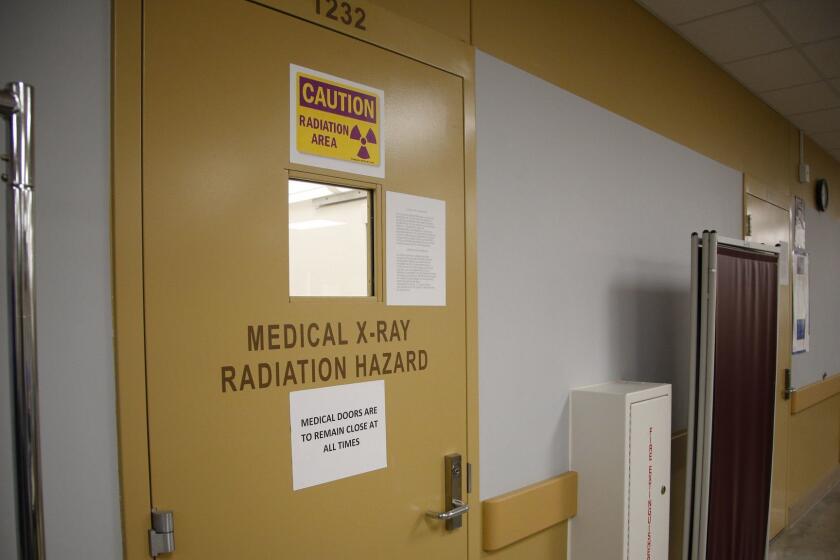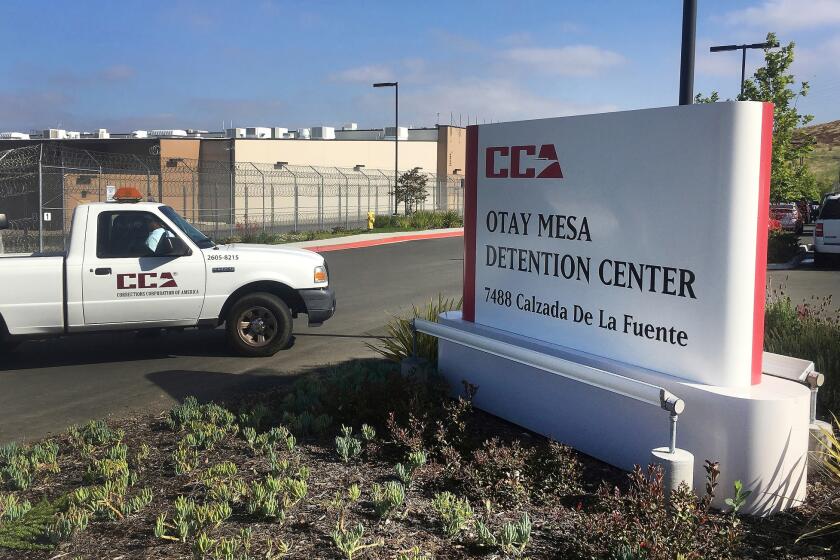Otay Mesa Detention Center blocks detainees’ phone calls to group of advocates
- Share via
Those held at Otay Mesa Detention Center can no longer call a group of activists who help them with money for food and phone calls and listen to their concerns about conditions inside.
CoreCivic, the private prison company that runs the facility, recently blocked calls to phone numbers belonging to Otay Mesa Detention Resistance, an organization that was instrumental in helping detainees share their experiences with journalists and others as the nation’s biggest COVID-19 outbreak among immigration detainees spread at the facility.
CoreCivic confirmed via email that it told the company that operates the phone lines to block the numbers.
“We took this action at the direction of our government partner,” said Amanda Gilchrist, spokeswoman for CoreCivic, referring to Immigration and Customs Enforcement. She directed further inquiry to ICE.
ICE said it blocked the numbers due to “safety concerns.”
“ICE has temporarily blocked detainee calls at Otay Mesa Detention Center to a specific San Diego-area phone number after detainee calls to this number resulted in detainees exhibiting highly disruptive behavior, threatening the health and security of other detainees and employees at the facility,” the agency said in a statement early Tuesday. “ICE takes very seriously the safety and well-being of those in our care and will take all necessary steps in order to ensure the continued safety of both detainees and staff.”
Detainees held by ICE and the U.S. Marshals Service are concerned that people who tested positive for the virus have been returned to their units too quickly.
It was not immediately clear to what behavior or incidents the statement referred.
Otay Mesa Detention Center, located in south San Diego, holds ICE detainees who are waiting for immigration court hearings or to be deported. It also holds inmates for the U.S. Marshals Service who are waiting for trials or sentencing in federal criminal cases.
Cristina Malo, part of the Otay Mesa Detention Resistance phone team, said being able to call people on the outside gives detainees hope, “in a place that’s very hopeless sometimes.”
She said that by having access to her group’s phone lines, detainees are less isolated from the rest of the world and can speak up if their rights are violated.
“It’s about holding people accountable to make sure that the detainees are still treated humanely,” Malo said.
Alex Mensing of Pueblo Sin Fronteras, a group that works closely with Otay Mesa Detention Resistance to support detainees, said his phone number was also blocked. He was able to verify this by calling Telmate, the company that operates the phone lines detainees pay to use.
Detainees at Otay Mesa Detention Center had complained of not having protective gear such as masks and not having adequate soap as precautions during the COVID-19 pandemic. New surgical masks arrived Friday, but they initially came with conditions -- a contract, one detainee says.
Telmate declined to comment on the record.
The phone team for Otay Mesa Detention Resistance usually receives calls all day long from people held at the facility, Malo said, but that stopped Wednesday.
At first the team thought something might be wrong with the phones, but the group soon learned that the numbers had been blocked.
Members of Otay Mesa Detention Resistance believe detention centers are not necessary, Malo said.
“Once you cage people, those who oversee the people who are caged up start to not see them as humans,” Malo said. “That’s the danger here.”
In April, the organization helped detainees tell their side of what happened after CoreCivic told them to sign contracts that released the company from liability in exchange for masks. Women in one of the housing units said they were threatened with pepper spray, and some said they were sprayed after they expressed frustration at having to sign contracts to get masks, when COVID-19 was already spreading at the facility.
CoreCivic has maintained that no force was used that day. The office of Sen. Kamala Harris (D-Calif.) has called for an investigation into the incident.
Otay Mesa Detention Resistance partnered with several organizations and Assemblywoman Lorena Gonzalez to try to deliver masks to detainees and inmates at the facility. In the end, the groups were not allowed to deliver the masks.
More than 200 detainees and inmates at the facility had tested positive for the coronavirus through the end of May, according to facility documents obtained by the San Diego Union-Tribune. Additionally, 29 CoreCivic employees and nine medical staffers tested positive.
One detainee, Carlos Ernesto Escobar Mejia, died after contracting COVID-19 at the facility.
Otay Mesa Detention Resistance said it plans to hold a demonstration Tuesday evening outside of the facility.
More to Read
Updates
5:07 p.m. June 16, 2020: This article was updated with information from Immigration and Customs Enforcement.
Sign up for Essential California
The most important California stories and recommendations in your inbox every morning.
You may occasionally receive promotional content from the Los Angeles Times.













